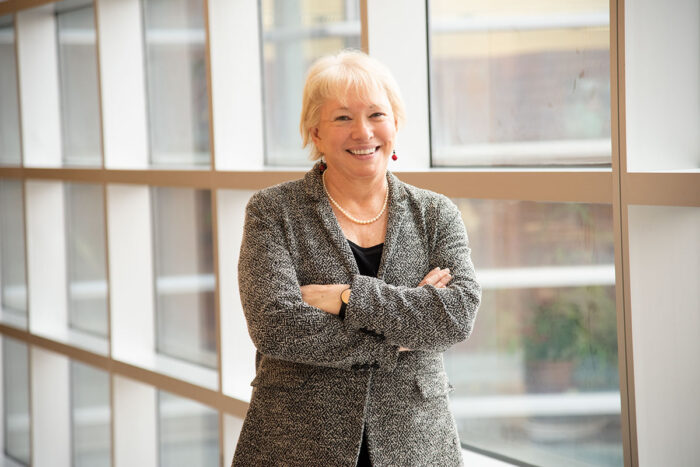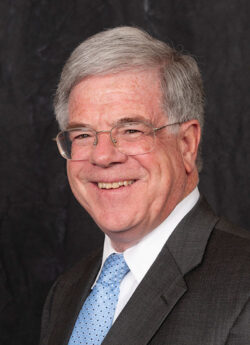Lodge named inaugural Blasingame professor
Professorship supports research into development of antifungal drugs, vaccines
 Washington University School of Medicine
Washington University School of MedicineJennifer Lodge, PhD, the vice chancellor for research at Washington University in St. Louis, has been named the inaugural David T. Blasingame Professor.
Jennifer K. Lodge, PhD, the vice chancellor for research at Washington University in St. Louis and a leading expert in fungus that can cause a potentially fatal brain infection, has been named the inaugural David T. Blasingame Professor. She also serves as the senior associate dean for research and a professor of molecular microbiology at the School of Medicine.
The new professorship, funded by Washington University, was created to honor the extraordinary contributions of David T. Blasingame, who led the university’s Alumni & Development Office for 28 years until his retirement in 2018.
Lodge was named to the professorship by Chancellor Andrew D. Martin and David H. Perlmutter, MD, executive vice chancellor for medical affairs, the George and Carol Bauer Dean of the School of Medicine, and the Spencer T. and Ann W. Olin Distinguished Professor.
“I am delighted to be recognizing Dr. Jennifer Lodge with a professorship honoring the legacy of David Blasingame,” Martin said. “Both of these distinguished individuals have long histories of extraordinary contributions to the university, and it is a pleasure to recognize those contributions with this professorship. The new professorship will support and facilitate the important work that Dr. Lodge continues to perform — including her outstanding leadership of the university’s research programs during these unprecedented pandemic times as well as the vital research she has conducted over her long and distinguished career. At the same time, we are recognizing the dedication of David Blasingame in his tireless commitment to raising vital funds for the university over his many decades of service.”
Lodge studies a type of fungus called Cryptococcus neoformans that typically causes lung disease that can spread through the blood to the brain in people. The fungal infection can cause meningitis in patients who are immune-compromised, and it kills an estimated 180,000 people each year. Her expertise is focused on the fungal cell wall, which is required for the fungus to grow and determine how the fungus interacts with the host. Understanding these processes could lead to new antifungal treatments and vaccines.
She is the author of over 75 scientific papers and, since 1997, her work has been funded continuously by the National Institutes of Health (NIH). In her administrative roles, Lodge also leads the massive research infrastructure across Washington University, and most recently has focused considerable efforts navigating the unprecedented circumstances and pressures the COVID-19 pandemic has placed upon the university’s research labs.
“Not only is Dr. Lodge a talented and productive scientist, she has done extraordinary work in her leadership of research for the medical school and the rest of the university, including tremendous work during the pandemic,” Perlmutter said. “We could not have had more capable leadership supporting our research programs, often times with essential services that otherwise go unrecognized and especially during this unprecedented time. Research is an essential part of everything we do, and Jennifer Lodge has been incredibly skilled in supporting interdisciplinary research projects that bring together collaborators across many departments, securing new potential funding opportunities, and maximizing the benefits of the university’s continuing investments in research and the infrastructure required to support it.”
Lodge is an elected fellow of the American Association for the Advancement of Science, the American Academy of Microbiology and the National Academy of Inventors. In 2014, she graduated from the Executive Leadership in Academic Medicine program at the university, and in 2015, she received the Academy of Science – St. Louis Trustee Award. She has served as chair of the Group on Research at the Association of American Medical Colleges and serves on several editorial boards and NIH review panels.
“It is an honor to receive this professorship recognizing the extraordinary contributions of David Blasingame,” Lodge said. “The support from the university will help continue my lab’s research into a debilitating and deadly infection. It also has been a tremendous honor to guide the extraordinary response of the university’s research community to this pandemic. Our researchers have spectacularly risen to the challenge posed by the virus — from donating protective equipment to our front-line health-care workers, to pivoting work in their labs to focus on COVID-19, to adhering to our public health guidelines so that we can productively continue our important research mission.”
Lodge earned her bachelor’s degree from Oberlin College in 1979 and her doctorate in biomedical sciences from Washington University in 1988. She continued her postdoctoral training at both Washington University and what was then Monsanto. She began her career at Saint Louis University School of Medicine, where she went on to serve as associate dean for research, from 2005 to 2009.
In 2009, she joined the Washington University faculty in the Department of Molecular Microbiology and also became the School of Medicine’s associate dean for research. In 2014, she was named vice chancellor for research for the entire university. In this role, she oversees university investments in research on the Medical and Danforth campuses, and oversees research compliance, education, grants and contracts.

Blasingame, a native of Little Rock, Ark., arrived as a freshman at Washington University in 1965 and went on to earn a bachelor’s degree in psychology and then a Master of Business Administration. Blasingame served in the U.S. Army and then returned to the university in 1974 as associate director of alumni relations. He was director of development for the John M. Olin School of Business from 1978 to 1985 and then named associate vice chancellor for alumni and development programs. In 1990, he was appointed vice chancellor of the department, and in 2004, he became executive vice chancellor.
Blasingame has a long history of success in leading campaigns supporting Washington University. In 2018, when Leading Together: The Campaign for Washington University ended, the program had raised more than $3.3 billion, surpassing the campaign’s initial goal of $2.2 billion. His achievements in university advancement have been recognized with several awards, including the Lifetime Achievement Award from the Association of Fundraising Professionals in St. Louis and the Circle of Excellence Award from the Council for the Advancement and Support of Education.
“I am so grateful for this professorship established in my name and could not be more pleased for Jennifer Lodge to serve as the inaugural holder,” Blasingame said. “While at Washington University, I saw the incredible passion and commitment our faculty bring to their work, and I had the distinct privilege of sharing news of their tremendous accomplishments with our alumni and friends. To have my name associated with our faculty’s life-changing scholarship, teaching, and research and with an institution that has meant so much to me is a very special honor.”






